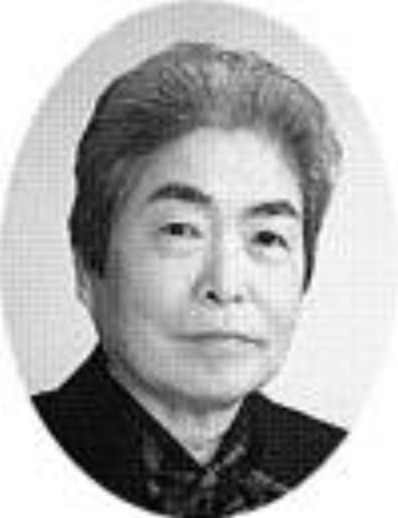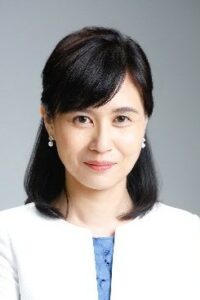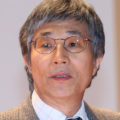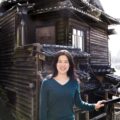Eulogy: Nakane Chie— A Life of Freedom and Determination
Kawai Kaori, Nonfiction writer
 Nakane Chie
Nakane Chie
Born in 1926, Nakane Chie was a social anthropologist. She was highly acclaimed for her analysis of Japanese society through her experience of fieldwork around the world. She continued her research after she became the first woman appointed to a professorship at the University of Tokyo in 1970. Nakane died of old age on October 12, 2021. She was 94. Her publications include Mikai no kao bunmei no kao (The uncivilized, the civilized; Winner of the Mainichi Publishing Culture Award), Tate shakai no ningen kankei (Personal relations in a vertical society).
Photo: Japan Academy/Creative Commons

Kawai Kaori
About ten years ago, an old lady in her 80s carrying a Boston bag arrived unannounced at a temple stood among the buildings in the Tokyo metropolitan area. She said that she wanted to buy a burial place at the temple. She went on to say that the family grave was in Musashino City in Tokyo, but she had fallen in love with Eihei-ji Temple (a temple of the Soto school of Zen Buddhism) and wanted to be buried alone in a Soto Zen Buddhist grave.
When the male clerk at the temple told her that it would be best to consult the family, the old lady flatly said there was no need to consult them because she had already made up her mind. Her resolve did not waver.
After she had left, the clerk was flustered when he realized that the old lady was Nakane Chie, the author of Tate shakai no ningen kankei (Personal relations in a vertical society), the best-seller that had been published in dozens of countries worldwide and sold 1.2 million copies in Japan. The two of them continued to meet and when the man confided in her that he would like to return to academia, Chie encouraged him and said he should definitely do it.
After many twists and turns, the man who had been a clerk became the priest who told this anecdote to Chie’s relatives at the memorial service on the forty-ninth day after her death. Chie had been awarded many honors including the Order of Cultural Merit and the Medal of Honor with Purple Ribbon. After she died, there was talk of a condolatory telegram from the Retired Emperor and the Emperor, but her family declined to accept it. She had wanted a quiet send-off and had even paid the cost of small funeral ceremony while she was still alive. There were only eight people in attendance.
Since I had been friends with Chie’s nephew for some twenty years, she agreed to several interviews and we even enjoyed cakes and red wine together. On one occasion, I told her that I was an adult graduate student, and she encouraged me, saying you can study for as long as you like. Even after she turned ninety, Chie herself never stopped reading articles and books in English, Tibetan and other foreign languages. She was someone who loved learning and embraced freedom with all her heart.
The last time I saw Chie was in February 2020 when I helped with her move. Chie had long shared a home with her mother in an apartment building in Takanawa (Minato Ward), famous for being the home of Yamaguchi Momoe and Miura Tomokazu when they were newly married. When Chie’s mother died, she lived there on her own.
I also helped her sort out what to keep and what to discard in order to let go of the apartment. Many commendation plaques and mementoes were scattered about the floor, but Chie quickly decided she didn’t need them anymore. From her work desk to documents and dishes, she disposed of almost everything. The only time I saw her hesitate a little was when her relatives asked her what to do with the washing machine. In the end, she decided to dispose of it, but this meant she would no longer be doing her own laundry. By this time, Chie had already spent two years in a facility for the elderly.
The reason was the fierce heatwave in the summer of 2018. Chie had collapsed in her apartment and was forced to spend several months in hospital. After she was dismissed from the hospital, she moved to a facility for the elderly at the advice of her doctor who found that living alone would be difficult for her. The facility restricted residents from bringing in luxury items. Until that time, her lifestyle had been to enjoy a nightcap of Johnny Walker neat, smoke cigarettes, and work until dawn. It was difficult for her to accept the lack of freedom imposed by these rules. At first, she drank whiskey at the facility, but she had to stop after being cautioned. Even so, she did not entirely let go of the things she liked. Her closet at the facility was full of new clothes delivered from department stores. She had studied in Italy and liked Italian-made clothes. Of course, she wasn’t going to wear them anywhere, and when the COVID-19 pandemic struck going out or meeting family members was not allowed. Even so, she enjoyed being surrounded by pleasant, fine-quality things.
She looked at several candidates before choosing the facility that became her final home. Apparently, the clincher was that the desk and the bed in the facility were arranged in a way that reminded her of the dormitory at Tsuda Juku Senmon Gakko (vocational school, currently Tsuda University) where she stayed in her youth. She said that she was indebted to Tsuda University and that she wanted to do something for future generations. Speaking of homes, Chie’s relatives told me an astonishing story. After graduating from Tsuda Juku Senmon Gakko in postwar 1947, Chie enrolled at the University of Tokyo, which had opened its doors to women. But Tokyo was still in the chaotic postwar period and no matter how she searched she could not find a boarding house near the university. The situation was urgent because classes were starting. Chie pleaded with a boarding house near the Akamon (Red Gate of University of Tokyo, one of the symbols of the University) to let her stay there. When they refused saying there were no vacant rooms, she pointed to the entrance and said, “This is fine.” She didn’t seem to think it strange that a young woman would sleep in the entrance to a house.
Chie had spent her childhood in Beijing, China in connection with her father’s work as a lawyer. The experience in China shaped her into a broad-minded personality not bothered by little things and she took no notice of whether someone was a man or a woman. By 1953, she was a researcher and went to work in remote India where elephants were the only form of transport. If there was no bed, she would sleep on the flat surface of a tree trunk split in half. She even ventured on her own into the jungle where there was a man-eating tiger. She wanted to be free to do her research wherever she wanted to go without the limitations imposed on women and men. She was often asked if it wasn’t dangerous for a woman on her own, but she would laugh it off and joke that the only danger she had encountered was a clan of headhunters who were curious about her neck.
Chie said that being the first woman is not at all significant because being the first woman is just a checkpoint, not an honor. Satsuki-kai is an alumni association for female graduates at the University of Tokyo, but despite invitations Chie never participated. She said that she felt it made no sense for women only to get together. Chie was also skeptical about preferential treatment for women to increase the proportion of women in managerial positions at organizations. She wanted women to improve their professional skills and the proportion of women to increase without any reference to whether someone was a man or a woman. This is why she emphasized the need for learning.
But she recognized that women were faced with more negatives due to the social environment. It is important to have a passion and to apply oneself to something before life changes because of marriage or children. She wondered if women were not sometimes distracted by criticism and set their own limits for what they could do. Based on her experience of tutoring university students in Britain and the United States, she said that women in other countries were stronger in the face of obstacles in their surroundings. She also said that there is a tendency not to respect older women in Japan. “Young pretty girls are best.” She deplored the preference for cute in Japanese society, which does not take women’s intelligence seriously.
What of Chie’s thoughts on marriage? When I asked her if the reason she did not consider marriage was that she wanted to be free to immerse herself in research, she laughed and replied laconically. “It’s not easy to say. I would have thought about it had I met the right person.”
When she became the first female assistant at the University of Tokyo, many opposing opinions were voiced at faculty meetings, claiming that women stop with research once they get married and that it’s better if they don’t work in research. At the time, she had been given the post at the strong recommendation of her supervisor and had no plans to marry. However, there had been a man she thought about marrying. She told me that he was a foreigner, but her mother was opposed and would not allow the marriage. Seeing how freely Chie apparently lived her life, why did she not defy her mother?
Chie’s descriptions of love in remote India are perfectly clear. While parents sleep, the suitor approaches the house to court the prospective partner while whistling or playing the reed pipe. Popular unmarried girls would have one suitor after another and receive them in a friendly manner. Chie writes engagingly about the courtship saying that the evenings were pleasant as well as very busy since any number of suitors would attempt a visit. She compared the scenes to a suitor serenading a prospective partner by playing the guitar under her window in rural villages in Italy. A strong and courageous woman, who affirmed all forms of lovemaking, she fell in love, but her love was shattered by parental disapproval. Was it a matter of the times, the relationship with her parents, or her own heart? I never asked her, but it is something I keep thinking about.
She obeyed when her marriage met with opposition, but otherwise she was not one to mince her words. She went through life making her dislikes clear. If someone gave her a gift, she would even send it back if it was something she didn’t need. At times, she startled me during our conversations when she abruptly interrupted me, saying she didn’t want to talk about these things. When she told her relatives about an ill-tempered nurse at the hospital where she was admitted several months before she died, a nurse walking past said “Really? Who is that then?” Chie laughed and said, “It’s you.” Even if the other person was in a superior position, her attitude did not change.
I was surprised at how often Chie would mention people who, for my generation, only exist in textbooks. For example, the French anthropologist and ethnologist Claude Lévi-Strauss (1908–2009), the British social anthropologist Edmund Ronald Leach (1910–89), Yanagita Kunio (1875–1962), the folklorist and founder of Japanese native folkloristics, or Shibusawa Keizo (1896–1963), the grandson of Shibusawa Eiichi, businessman and folklorist. As a student, she shared her notes with Prince Mikasa (1915–2016) who was her classmate. I heard that the prince even visited her home, but she had no interest in authority and prestige. She disliked superficial excuses and pushed aside interference. The scale of her perspective was large, extending far and wide beyond a gaze that looked straight at the essence of things.
After Chie died, I tried re-reading Nihonteki shakai-kozo no hakken (The discovery of a Japanese type of social structure), which was published in the general opinion magazine Chuokoron in 1964. The research was greatly admired and became the basis for Tate shakai no ningen kankei (Personal relations in a vertical society). The sharpness of her logic is still impressive today. The work is built on her knowledge of cultural anthropology, but as someone who knew Chie, I would say that there is more to it. Perhaps because her innermost perspective was free and she kept her distance from the uniqueness of Japanese society
Raised in Beijing, Chie changed into a sky-blue dress immediately after hearing the Gyokuon hoso (radio broadcast announcing acceptance of the Potsdam Declaration and the end of the war by the Emperor Hirohito on August 15, 1945). She was never daunted by people continually telling her, “You’re a woman, it’s impossible.” But she also lived her whole life with the pain of having given up marriage. In her research, she says that the mind and body of individuals are bound together by the cohesion of the “ie” (household) social group, but her own life experience may be linked to her skeptical outlook on the structure of the uniqueness of Japanese society.
Chie had the perspective of someone from abroad, which is not available to people inside the vertical society. Thanks to her pioneering work, rugged trails have become smooth paths spreading out in many directions. But there are still inaccessible paths. I wonder what Chie would say about the situation.
Translated from “Tsuito: Nakano Chie—Kakugo to senaka-awaseno jiyu wo ikita kanojo (Eulogy: Nakane Chie— A Life of Freedom and Determination),” Chuo koron, February 2022, pp. 140–144. (Courtesy of Chuokoron Shinsha) [March 2022]
Keywords
- Kawai Kaori
- writer
- Usuke Boys
- Nakane Chie
- social anthropologist
- Tate shakai no ningen kankei
- Personal Relations in a Vertical Society
- Japanese society
- vertical society
- cultural anthropology
- Tsuda University
- University of Tokyo
- marriage
- women




